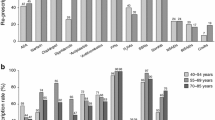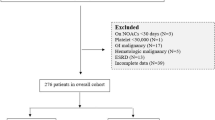Abstract
Purpose
The use of gastroprotective agents has allowed significant progress in the prevention of upper gastrointestinal bleeding (UGIB) associated with non-steroidal anti-inflammatory drugs (NSAIDs) and antiplatelet agents. Nevertheless, some concerns remain regarding the gastroprotective dosage and treatment duration. Our aim was to study the effect of gastroprotective agents in UGIB induced by NSAIDs and single- or dual-antiplatelet therapy.
Methods
A multicenter case-control study was conducted including 577 cases diagnosed with UGIB and 1343 sex-, age-, and hospital-matched controls. To estimate exposure to NSAIDs and gastroprotective agents, consumption was calculated for the 4 weeks prior to hospital admission in terms of defined daily doses (DDDs). Risk groups for UGIB induced by NSAIDs and single- or dual-antiplatelet therapy were defined as a function of each drug dose, use of gastrointestine-damaging drugs, and risk factors for UGIB. Odds ratios (ORs) with 95% confidence intervals (CIs) were adjusted for single- (model 1) and dual- (model 2) antiplatelet therapy.
Results
Full adherence (> 0.80DDD) to proton pump inhibitors (PPIs) was the only gastroprotective therapy that significantly reduced the risk of UGIB, considering NSAID risk (OR: 0.53; 95% CI: 0.30–0.95) and dose (OR: 0.48; 95% CI: 0.27–0.87) with ORs adjusted for single-antiplatelet therapy (model 1) and NSAID risk (OR: 0.55; 95% CI: 0.31–0.98) and dose (OR: 0.49; 95% CI: 0.28–0.89) with ORs adjusted for dual-antiplatelet therapy (model 2).
Conclusions
These results reinforce the recommendation of adding a PPI at effective doses (full adherence) to prevent UGIB induced by NSAIDs, or single- or dual-antiplatelet therapy.
Similar content being viewed by others
References
Klein A, Gralnek IM (2015) Acute, nonvariceal upper gastrointestinal bleeding. Curr Opin Crit Care 21:154–162
Czernichow P, Hochain P, Nousbaum JB, Raymond JM, Rudelli A, Dupas JL, Amouretti M, Gouérou H, Capron MH, Herman H, Colin R (2000) Epidemiology and course of acute upper gastro-intestinal haemorrhage in four French geographical areas. Eur J Gastroenterol Hepatol 12:175–181
Hreinsson JP, Kalaitzakis E, Gudmundsson S, Björnsson ES (2013) Upper gastrointestinal bleeding: incidence, etiology and outcomes in a population-based setting. Scand J Gastroenterol 48:439–447
Malmi H, Kautiainen H, Virta LJ, Färkkilä N, Koskenpato J, Färkkilä MA (2014) Incidence and complications of peptic ulcer disease requiring hospitalisation have markedly decreased in Finland. Aliment Pharmacol Ther 39:496–506
Quan S, Frolkis A, Milne K, Molodecky N, Yang H, Dixon E, Ball CG, Myers RP, Ghosh S, Hilsden R, van Zanten S, Kaplan GG (2014) Upper-gastrointestinal bleeding secondary to peptic ulcer disease: incidence and outcomes. World J Gastroenterol 20:17568–17577
Hermansson M, EkedahlA RJ, Zilling T (2009) Decreasing incidence of peptic ulcer complications after the introduction of the proton pump inhibitors, a study of the Swedish population from 1974-2002. BMC Gastroenterol 9:25. https://doi.org/10.1186/1471-230X-9-25
Sung JJY (2010) Marshall and Warren lecture 2009: peptic ulcer bleeding: an expedition of 20 years from 1989-2009. J Gastroenterol Hepatol 25:229–233
Zeitoun JD, Rosa-Hézode I, Chryssostalis A, Nalet B, Bour B, Arpurt JP, Denis J, Nahon S, Pariente A, Hagège H, Groupe des Hémorragies Digestives Hautes de l’ANGH (2012) Epidemiology and adherence to guidelines on the management of bleeding peptic ulcer: a prospective multicenter observational study in 1140 patients. Clin Res Hepatol Gastroenterol 36:227–234
Dworzynski K, Pollit V, Kelsey A, Higgins B, Palmer K; Guideline Development Group (2012) Management of acute upper gastrointestinal bleeding: summary of NICE guidance. BMJ 344. https://doi.org/10.1136/bmj.e3412
Lanza FL, Chan FK, Quigley EM, Practice Parameters Committee of the American College of Gastroenterology (2009) Guidelines for prevention of NSAID-related ulcer complications. Am J Gastroenterol 104:728–738
Lanas A, Benito P, Alonso J, Hernández-Cruz B, Barón-Esquivias G, Perez-Aísa Á, Spanish Society of Rheumatology; Spanish Association of Gastroenterology; Spanish Society of Cardiology et al (2014) Safe prescription recommendations for non steroidal anti-inflammatory drugs: consensus document elaborated by nominated experts of three scientific associations (SER-SEC-AEG). Reumatol Clin 10:68–84. https://doi.org/10.1016/j.reuma.2013.10.004
Bhatt DL, Scheiman J, Abraham NS, Antman EM, Chan FK, Furberg CD, American College of Cardiology Foundation Task Force on Clinical Expert Consensus Documents et al (2008) ACCF/ACG/AHA 2008 expert consensus document on reducing the gastrointestinal risks of antiplatelet therapy and NSAID use: a report of the American College of Cardiology Foundation task force on clinical expert consensus documents. J Am Coll Cardiol 52:1502–1517
Abraham NS, Hlatky MA, Antman EM, Bhatt DL, Bjorkman DJ, Clark CB, Furberg CD, Johnson DA, Kahi CJ, Laine L, Mahaffey KW, Quigley EM, Scheiman J, Sperling LS, Tomaselli GF, ACCF/ACG/AHA (2010) ACCF/ACG/AHA 2010 expert consensus document on the concomitant use of proton pump inhibitors and thienopyridines: a focused update of the ACCF/ACG/AHA 2008 expert consensus document on reducing the gastrointestinal risks of antiplatelet therapy and NSAID use: a report of the American College of Cardiology Foundation task force on expert consensus documents. Circulation 122:2619–2633
Eusebi LH, Rabitti S, Artesiani ML, Gelli D, Montagnani M, Zagari RM, Bazzoli FE (2017) Proton pump inhibitors: Risks of long-term use. J Gastroenterol Hepatol 32:1295–1302
Heidelbaugh JJ, Kim AH, Chang R, Walker PC (2012) Overutilization of proton pump inhibitors: what the clinician needs to know. Ther Adv Gastroenterol 5:219–232
Vakil N (2012) Prescribing proton pump inhibitors: is it time to pause and rethink? Drugs 72:437–445
Chan FK (2008) Proton-pump inhibitors in peptic ulcer disease. Lancet 372:1198–1200
Figueiras A, Estany-Gestal A, Aguirre C, Ruiz B, Vidal X, Carvajal A, on behalf of the Empoghen group et al (2016) CYP2C9 variants as a risk modifier of NSAID-related gastrointestinal bleeding: a case-control study. Pharmacogenet Genomics 26:66–73
Vidal X, Ibáñez L, Vendrell L, Conforti A, Laporte JR, Spanish-Italian Collaborative Group for the Epidemiology of Gastrointestinal Bleeding (2008) Risk of upper gastrointestinal bleeding and the degree of serotonin reuptake inhibition by antidepressants: a case-control study. Drug Saf 31:159–168
TrinityBiotech. Helicobacter pylori test. Available at: https://www.trinitybiotech.com/news-events/news/trinity-biotech-announces-ce-marking-of-uni-gold-h-pylori-antigen-point-of-care-test/. Accessed 9 July 2018
Gisbert JP, Abraira V (2006) Accuracy of Helicobacter pylori diagnostic tests in patients with bleeding peptic ulcer: a systematic review and meta-analysis. Am J Gastroenterol 101:848–863
Definition and general considerations of DDD [on line], last updated 2018–02-07, WHO Collaborating Centre for Drug Statistics Methodology, Norwegian Institute of Public Health. Available at: http://www.whocc.no/ddd/definition_and_general_considera/. Accessed 9 July 2018
Goldstein JL, Howard KB, Walton SM, McLaughlin TP, Kruzikas DT (2006) Impact of adherence to concomitant gastroprotective therapy on nonsteroidal-related gastroduodenal ulcer complications. Clin Gastroenterol Hepatol 4:1337–1345
Valkhoff VE, van Soest EM, Mazzaglia G, Molokhia M, Schade R, Trifiro G, Goldstein JL, Hernandez-Diaz S, Kuipers EJ, Sturkenboom MCJM (2012) Adherence to gastroprotection during cyclooxygenase 2 inhibitor treatment and the risk of upper gastrointestinal tract events: a population-based study. Arthritis Rheum 64:2792–2802
Castellsague J, Riera-Guardia N, Calingaert B, Varas-Lorenzo C, Fourrier-Reglat A, Nicotra F et al (2012) Individual NSAIDs and upper gastrointestinal complications: a systematic review and meta-analysis of observational studies (the SOS project). Drug Saf 35:1127–1146
Laporte JR, Ibáñez L, Vidal X, Vendrell L, Leone R (2004) Upper gastrointestinal bleeding associated with the use of NSAIDs: newer versus older agents. Drug Saf 27:411–420
Valkhoff VE, Sturkenboom MC, Kuipers EJ (2012) Risk factors for gastrointestinal bleeding associated with low-dose aspirin. Best Pract Res Clin Gastroenterol 26:125–140
Carvajal A, Ortega S, Del Olmo L, Vidal X, Aguirre C, Ruiz B et al (2011) Selective serotonin reuptake inhibitors and gastrointestinal bleeding: a case-control study. PLoS One 6(5):e19819. https://doi.org/10.1371/journal.pone
Leontiadis GI, Sreedharan A, Dorward S, Barton P, Delaney B, Howden CW et al (2007) Systematic reviews of the clinical effectiveness and cost-effectiveness of proton pump inhibitors in acute upper gastrointestinal bleeding. Health Technol Assess 11:iii-iv,1–164
Anonymous (2011) Nonsteroidal anti-inflammatory drugs: add an anti-ulcer drug for patients at high risk only. Always limit the dose and duration of treatment with NSAIDs. Prescrire Int 20:216–219
Casado Arroyo R, Polo-Tomas M, Roncalés MP, Scheiman J, Lanas A (2012) Lower GI bleeding is more common than upper among patients on dual antiplatelet therapy: long-term follow-up of a cohort of patients commonly using PPI co-therapy. Heart 98:718–723
Vaduganathan M, Bhatt DL, Cryer BL, Liu Y, Hsieh WH, Doros G, COGENT Investigators et al (2016) Proton-pump inhibitors reduce gastrointestinal events regardless of aspirin dose in patients requiring dual antiplatelet therapy. J Am Coll Cardiol 67:1661–1671
Rotman SR, Bishop TF (2013) Proton pump inhibitor use in the U.S. ambulatory setting, 2002–2009. PLoS One 8(2):e56060. https://doi.org/10.1371/journal.pone.0056060
Lanas A (2016) We are using too many PPIs, and we need to stop: a European perspective. Am J Gastroenterol 111:1085–1086
Farrell B, Pottie K, Thompson W, Boghossian T, Pizzola L, Rashid FJ, Rojas-Fernandez C, Walsh K, Welch V, Moayyedi P (2017) Deprescribing proton pump inhibitors: evidence-based clinical practice guideline. Can Fam Physician 63:354–364
Guarantor of the article
C Aguirre and B Ruiz.
Funding
In Spain, this study was funded by the national Health Research Fund (Fondo de Investigación Sanitaria) (Ministry of Economy and Competitiveness), grant numbers PI 02/1512, 02/0661/, 02/1364, and 02/1572 and by the Department of Health of the Basque Country, grant numbers 03/11092 and 11/111103; as well as supported in part in Catalonia by the Novartis, Pfizer and Dr. Esteve pharmaceutical companies. In Italy, the study was funded by unrestricted grants from Pfizer Italy and Department of Medicine and Public Health, University of Verona. The funders had no role in the study design, data-collection and analysis, decision to publish, or preparation of the manuscript.
Author information
Authors and Affiliations
Contributions
A Figueiras, A Carvajal, L Ibañez, A Conforti, and C Aguirre: design of the research study, obtained funding; critical revision of the manuscript for important intellectual content. B Ruiz, A Estany-Gestal, L Rodella, P Ruiz: acquisition of data. B Ruiz, U Aguirre, C Aguirre: statistical analysis. B Ruiz and C Aguirre: drafting of the manuscript. MM de Pancorbo, X Vidal, and LH Martin: critical revision of the manuscript for important intellectual content. All authors approved the final version of the manuscript.
Corresponding author
Ethics declarations
The study protocol was approved by the institutional review boards of all participating hospitals. All patients were provided with information about the study and gave written informed consent.
Conflict of interests
The authors declare that they have no conflict of interest.
Rights and permissions
About this article
Cite this article
Ruiz, B., Aguirre, U., Estany-Gestal, A. et al. Only full adherence to proton pump inhibitors protects against drug-induced upper gastrointestinal bleeding. Eur J Clin Pharmacol 74, 1503–1511 (2018). https://doi.org/10.1007/s00228-018-2523-4
Received:
Accepted:
Published:
Issue Date:
DOI: https://doi.org/10.1007/s00228-018-2523-4




